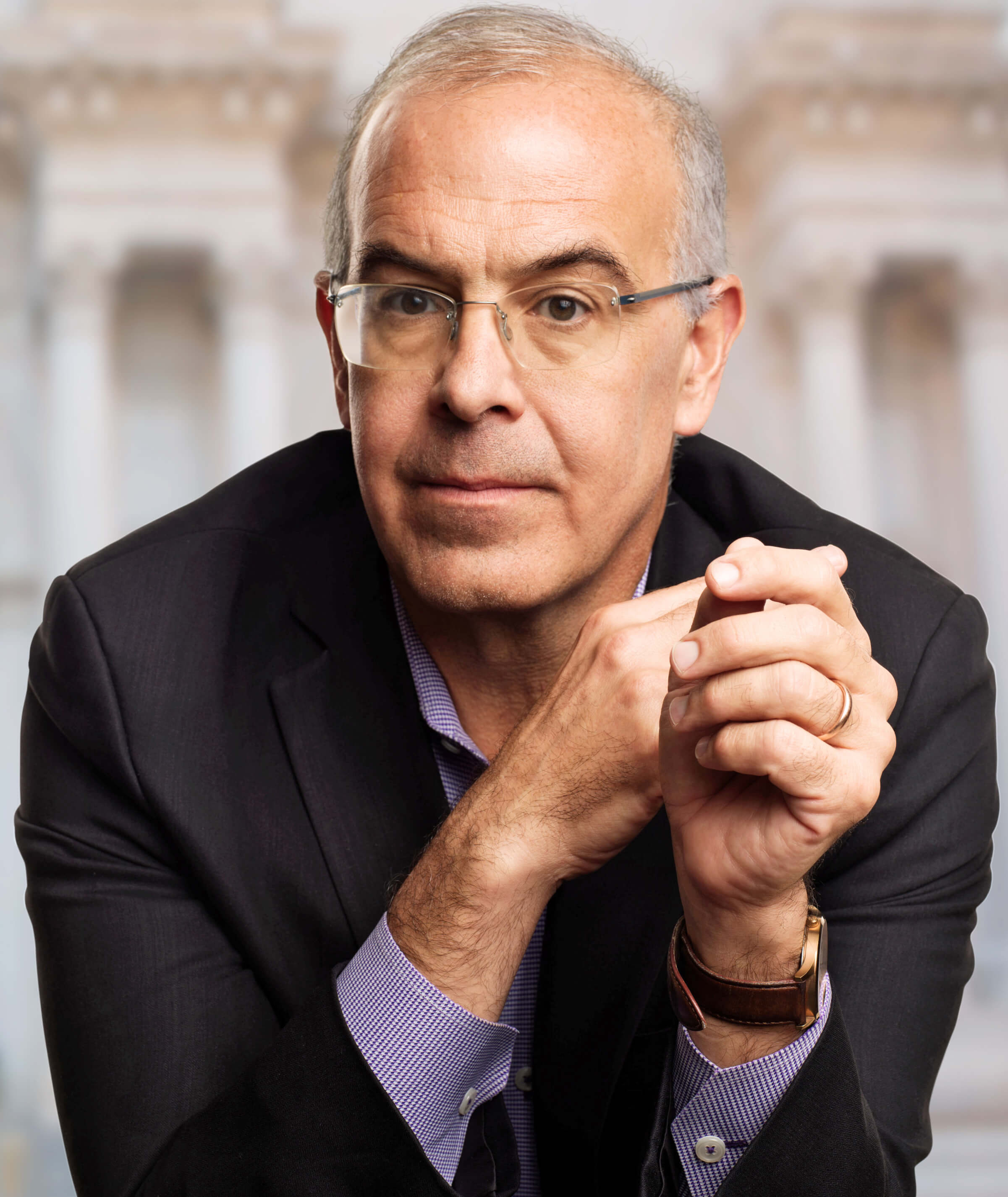Q&A with David Brooks
“THE WAY TO HEAL THESE GREAT DIVIDES IS ONE PERSON AT A TIME.”
—DAVID BROOKS, THE CELEBRATED PUNDIT, 62, HAS TURNED HIS GAZE TO AMERICA’S DIVISIONS.

You have talked about your “mission” to generate discussion about things like morality and respect, including in your new book, How to Know a Person: The Art of Seeing Others Deeply and Being Deeply Seen. What motivated this?
I think as a society we are over-politicized and under-moralized. We spend too much time thinking about politics and not enough time on the things that really matter, which are having courage and honesty, being honorable and being capable of great love.
You focus on two questions: “Why are Americans sad?” and “Why do Americans seem so mean?”
The statistics are horrific: rising suicide rates, rising depression. The number of people who rank themselves in the lowest happiness category has gone up by 50 percent. It’s a societal breakdown. When people feel invisible and unseen, they regard that as an injustice. They get angry and lash out and become mean.
When did we head down that road?
Probably sometime around 2000. I think it was partly accelerated by smartphones and social media.
You also point to widespread loneliness.
People are less likely to attend church, synagogue and mosque, to belong to the Elks Club or the Kiwanis Club. They have smaller families. Those are some of the causes. A lot of the cause of loneliness and isolation is that people are not good at socializing. Just the act of showing respect is the first step to healing some of the enmity.
You note that moral lessons are not being conveyed like they once were.
There were all sorts of morally formative institutions that were very popular in American life, ranging from the Boy Scouts to the schools to the McGuffey Readers. Then sometime after World War II, people decided human beings don’t need to be trained anymore in the basic skills of how to be a good person: how to listen well, how to ask for forgiveness, how to end a conversation gracefully. These are skills just like carpentry and plumbing are skills.
Americans are, of course, deeply divided. How can we start to come together?
I would start with institutional reforms. Ones that I support include rank choice voting or open primaries as a way to have elections so that it’s not just Party A and Party B. These angry minorities dominate everything. We need political leadership that isn’t ripping the country to shreds from the top. But I focus on the bottom. I think the only way to heal these great divides is one person at a time. This is really about having conversations. My goal is to try to see the world a little bit from the perspective of the other person.
Is there a dearth of adult leadership in Washington these days?
My view is that there are a lot of good people here, but they are caught in a rotten system. In private, the politicians I have interviewed have been very reasonable, but when they go on TV, they look like monsters with brutal talking points.
Are you optimistic going forward?
If you go back through American history, it’s very hard to pick a decade where we didn’t have real challenges. I think we have become a fairer society. We have made progress in allowing women and minorities to use their talents to contribute more. I remain optimistic that the strength America has always had, the freedom and dynamism, those strengths are still there and will see us through.
The 2024 election looms. What are the key issues for older Americans?
People worry about Medicare and Social Security. I think those are safe. The main issue, for older Americans especially, is you want to give back a better world than you inherited. It’s called generativity. Are we going to pass down a country whose democracy is not functioning, where prosperity is not widely shared? It’s an existential crisis that should be of interest especially to this generation.
You’re now in your early 60s. Have your ideas about aging changed over time?
We have a whole new life stage. I call them “the encore years.” If you’re retired and you’re 60, you might have 20 or 30 years of vibrant life left. I interviewed one woman who was a lawyer. She retired and became a playwright. She said, “I want to do things in fields I know nothing about. I can fail big. I’m 65, who cares?” I really admire that.
You quote a psychologist who says, “Human beings ... are continual works in progress.” Yourself included?
If you had met me 30 years ago, you would have found me a little aloof. I’ve learned to be more relational and humbler. I’m more in touch with my emotions, even the sad ones, but I decided at a certain middle age that I didn’t want to shut myself off from life.
Let’s end with one of your favorite questions: “What crossroads are you at in life?”
I’m at that moment where you step back in life and think, OK, what am I going to do with the years left? What’s the big adventure that I want to have before the final curtain?
Interview by Tom Dunkel